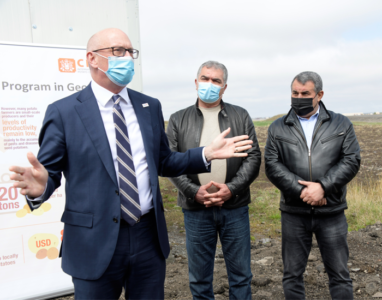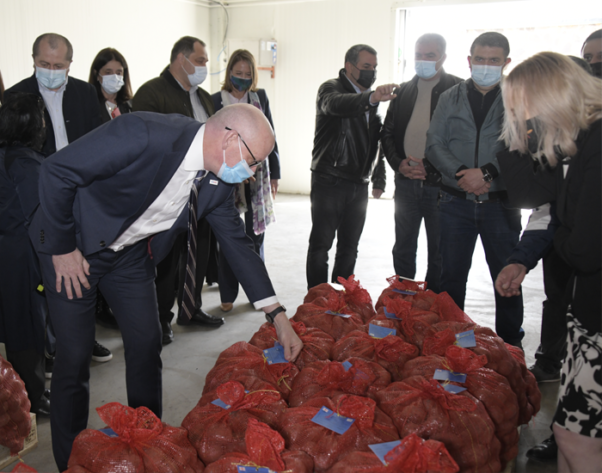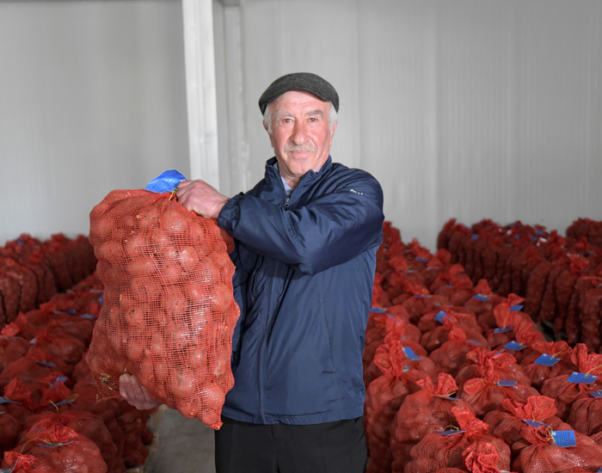
Dignitaries, researchers, and private sector representatives gathered this week in southwestern Georgia to celebrate the opening of potato seed model farm that will provide ideas, training and high-quality seed to potato farmers throughout the country.

The seed model farm is one part of the USAID Potato Program in Georgia, a multi-faceted intervention to improve potato seed systems in the country. Potato is known as “second bread” to many Georgians due to its popularity, but potato productivity levels remain low in the country due to pests and diseases in seed potatoes and a lack of healthy planting materials.
The International Potato Center (CIP) is leading the initiative, lending its experience to facilities such as the seed model farm and providing expertise for laboratory, field, and greenhouse-based aspects of the program.
CIP’s regional leader for Central Asia and Caucasus, Rusudan Mdviani, says the potato program will take its true strength from Georgian partnerships.
“Right now we are collaborating with the Agricultural Advisory Service and Javakheti Agro Company, which have allocated greenhouse space and fields for our work. In exchange, we will provide training for their employees,” she said.
The event began in Akhalkalaki, where participants visited a cold storage unit that can hold up to 22 tons of seed potato for distribution. In the afternoon, they traveled to a seed model farm in Akhaltsikhe, where they toured an indoor seed production laboratory in which 19 potato varieties (supplied by CIP) are being multiplied in-vitro through a technology called apical rooted cuttings. Eight hundred of these cuttings were given during the event to an FAO project for establishing four demonstration plots. The demonstration plots will be used to educate and inform farmers in the region about the importance of quality seed potato for improved production.
According to USAID’s Mission Director to Georgia, Peter Wiebler, the seed model farm is a key piece for building improved incomes and livelihoods in the country:
“We want the Georgian economy to become stronger and develop and we are pleased with the progress of this program in the past year and we are optimistic for good results…. All the pieces of this program will increase yields for farmers and place nutritious potato in the marketplace at affordable prices. And, what’s more, our work with the private sector will create jobs for Georgians.”

To accommodate the anticipated higher yields, the USAID Potato Project in Georgia is also creating potato producer network responsible for disseminating improved potato varieties and associated technology. Through the course of the project, it is expected that at least 50% of the participating farmers will become certified quality seed producers, providing improved seed potatoes to more than 15,000 smallholders farmers. The expected income gains from this network are expected to be worth approximately USD 8.7 million per year in Georgia.
Every potato seed generated and sold in Georgia will mean fewer dollars going abroad. “Right now, we buy seeds from Holland and Germany for as much as eight million Euros annually,” said USAID Potato Program project coordinator in Akhalkalaki, Makhare Matukatov. “We hope the demonstration fields will entice more farmers to join our project and elevate the potato sector to new heights.”

Overall, the USAID Potato Project is a direct response to recent Government of Georgia priorities in terms of increasing resilience of the country to supply shocks such as COVID-19. Increasing competitiveness of the Georgian agriculture sector will not only increase food security and self-reliance in the times of crisis but also boost the country’s export profile and advance high-value job creation.
- Akhalkalaki has new varieties of potatoes and a new warehouse for seeds (J News)
- A three-year commitment plan to improve potato production (ATV 12)
- Model farming in Akhaltsikhe (TOK TV Georgia)
The International Potato Center (CIP) was founded in 1971 as a research-for-development organization with a focus on potato, sweetpotato and Andean roots and tubers. It delivers innovative science-based solutions to enhance access to affordable nutritious food, foster inclusive sustainable business and employment growth, and drive the climate resilience of root and tuber agri-food systems. Headquartered in Lima, Peru, CIP has a research presence in more than 20 countries in Africa, Asia and Latin America.
CIP is a CGIAR research center, a global research partnership for a food-secure future. CGIAR science is dedicated to reducing poverty, enhancing food and nutrition security, and improving natural resources and ecosystem services. Its research is carried out by 15 CGIAR centers in close collaboration with hundreds of partners, including national and regional research institutes, civil society organizations, academia, development organizations and the private sector. www.cgiar.org
About USAID: On behalf of the American people, we promote and demonstrate democratic values abroad, and advance a free, peaceful, and prosperous world. In support of America’s foreign policy, the U.S. Agency for International Development leads the U.S. Government’s international development and disaster assistance through partnerships and investments that save lives, reduce poverty, strengthen democratic governance, and help people emerge from humanitarian crises and progress beyond assistance.
